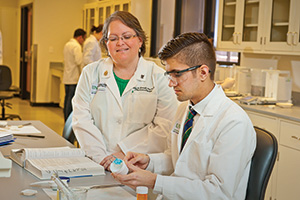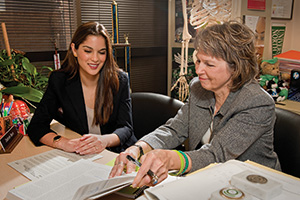Learn more about
UNT Legal and Health
Listen to a KERA podcast about the UNT Dallas College of Law
Learn more about the UNT System law and allied health colleges
Listen to a KERA podcast about the UNT Dallas College of Law
Learn more about the UNT System law and allied health colleges

As a boy, Ethan Wheeler wondered how medicine took the pain away.
But thanks to biology and pharmacology classes taken in UNT's pre-pharmacy program as an undergraduate, Wheeler ('12), now a student in the UNT System College of Pharmacy that opened this fall in Fort Worth, understands the complexity of how medicine relieves pain and treats illness. Because of that solid foundation, the biology graduate is flourishing in the North Texas region's first four-year pharmacy program. Meanwhile, Joy Nnama, who will earn her bachelor's degree in applied arts and sciences from UNT in May, is soaking up knowledge so that she is a strong applicant for the UNT Dallas College of Law that opens in fall 2014.
Students have an excellent pathway for health and legal careers through UNT's comprehensive degree offerings. Math and science programs lay the foundation for health professions while programs in fields such as political science, business and communications prepare students for law professions. Professors, advisors and alumni provide guidance and mentoring along the journey. And students get hands-on experience and career insight through internships and student organization involvement.
With the UNT System College of Pharmacy and the UNT Dallas College of Law, budding pharmacists and lawyers can access two new programs -- ones built from the same high-quality mold as UNT. Like UNT, both programs emphasize access, affordability and hands-on experience and symbolize the UNT System's expanding impact in the North Texas region.

Nnama balanced her classroom learning by job shadowing Lara Tomlin ('07), an assistant district attorney in the Denton County District Attorney's Office, through the UNT Career Center's Take Flight program.
"The professors teach you there is a world out there so I can take what I learned in school and apply it to real life," Nnama says. "It's one thing to dream to be a lawyer, but it's another thing to experience it."
In Wheeler's pharmacology class, he learned how drugs affect the body -- essential knowledge for pharmacy school -- while a neuropsychopharmacology course exposed him to innovative research on how drugs affect the brain.
"I got a great education from my professors because of their teaching style and research," Wheeler says.

Besides his classes, his biggest boost came from health professions advisors Debrah Beck ('73, '83 M.A., '95 Ph.D.) and Patavia Whaley.
The advisors make sure students take the right classes, keep up their grades, volunteer, get involved in student organizations and job shadow.
They also help students to prepare to apply for medical, dental, veterinary or pharmacy schools, which can take up to one and a half years. Their one-on-one guidance gives students the best chance of being accepted.
"We help them be competitive candidates," Beck says.
Wheeler also gained leadership skills and connected with pharmacists as president of the Eagle's Pre-Pharmacy Association at UNT, which Beck and Whaley advise.
They steered Wheeler to the UNT System College of Pharmacy, which has been a perfect fit. Wheeler says he likes its metropolitan location, its ties to the healthcare industry and, most importantly, its inter-professional focus.
Housed at the UNT Health Science Center, the pharmacy college is the first in Texas to be located on a health science center campus. Pharmacists are educated alongside physicians, physician assistants, public health professionals and researchers -- each benefiting from the other's insight.
"You get to think about a patient's experience from all different healthcare perspectives, so you can give better treatment," Wheeler says.
The pharmacy college's founding dean, Myron Jacobson, says the program stands out because of the "team sport" approach, which ultimately is about improving healthcare.
"UNT does an excellent job of preparing students for professional careers," says Jacobson, who taught chemistry at UNT from 1974 to 1985. "They not only get a strong grounding in education but they also have an opportunity to do research. That coupled with a good advising system allows them to develop realistic career expectations."
Jacobson and Beck are working on aligning classes and recruitment between the pharmacy college and UNT. Beck hopes to establish a formal bridge program.
Lisa Killam-Worrall ('96) knows just how well UNT prepares students for a health profession. The excellent lab and academic research training she received as a biology student was an advantage in pharmacy school and in her career.
Killam-Worrall was a drug information specialist and professor after earning her Doctor of Pharmacy, but she had her eye on joining the faculty of the pharmacy college when it was proposed. She knew it would have the same quality as UNT and UNT Health Science Center programs.
Now in her work as assistant dean for experiential education and associate professor, Killam-Worrall helps students, like Wheeler, get clinical and preceptorship experience. She's also a role model, proudly hanging her UNT degree in her office so pharmacy students see the fruits of success.
"It helps put them at ease and shows them that they can make it," Killam-Worrall says.
Nnama is on her way to making it, thanks to mentors who include Myra Hafer, UNT's admissions liaison at Collin College, where she earned an associate's degree. Now seven years after leaving Nigeria, the mother of four is preparing for her LSAT so she can apply to the new law school next year.
Shadowing Tomlin, who is an appellate attorney for the DA's Office, Nnama sat in on trials, read legal briefs and networked with other attorneys. Tomlin, who graduated with a bachelor's degree in international studies, gives job shadow students a realistic view of the demanding profession while also sharing her love for it.
"Working with students makes me proud of my profession, reminding me of the importance of what I do," says Tomlin, who decided to become a lawyer after her internship in Washington, D.C., through UNT's North Texas in D.C. Program.
Judge Royal Furgeson Jr., founding dean of the UNT Dallas College of Law, says coming from an undergraduate program with high standards and rigorous coursework is a recipe for law school success. Like the pharmacy college, the law college, which is the first public law school in the city of Dallas, has a unique approach to education. A lab component requires students to do real-world exercises such as designing a litigation plan.
Furgeson, who was a U.S. district judge for 19 years, says the lab work is essential because many young lawyers need more practice-ready competency.
"Our law school will be full of innovative ways to help people prepare for the law profession," Ferguson says.
That innovation and the law school's emphasis on affordability and quality are key to its mission.

She says UNT's focus on experiential learning and the faculty's drive for excellence give students the edge. Like many of her colleagues, King is a devoted teacher.
"I have a taxpayer view of higher education. We have to be accountable to students," King says. "That guides everything I do."
Her influence as a mentor is evident on students like Eryn Mascia. The political science freshman and Honors College student recently won a Moot Court Champion title in her first college tournament. It was a coup since she had only a year of high school debate and had to switch arguments and learn a new law and case precedents a day before competition.
Thanks to coaching from King and the captain of UNT's team, which ranks fifth in the nation, Mascia and her debate partner won -- and Mascia is now focused on pursuing a law career.
"Dr. King helped me cement that I wanted to do this," Mascia says. "She cares about all of us and wants us to do well."